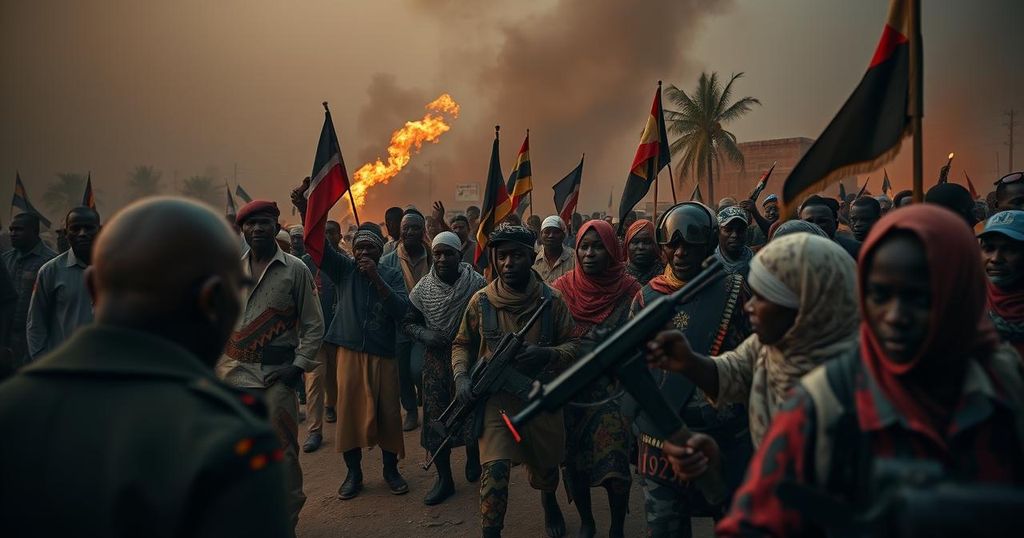Recent investigations have revealed that popular support for military juntas in Mali, Burkina Faso, and Niger is declining due to unmet promises and violent tactics used by Russian mercenaries. While the juntas initially gained favor by opposing former colonial powers, the situation on the ground has deteriorated, leading to increasing calls for accountability and dissent from within the civilian population.
The escalating discontent towards military juntas in Mali, Burkina Faso, and Niger has become increasingly apparent, particularly following the coups that occurred between 2021 and 2023. These juntas initially attracted support by accusing previous civilian administrations of colluding with France to exploit local resources. However, investigations reveal that public support is waning due to unmet promises and the violent tactics employed by Russian mercenaries against civilians. Evelyn Groenink, the coordinator of the Dutch media platform ZAM, articulated this shift in sentiment, stating, “The first slogans, ‘Russia out,’ have appeared on the walls of the Russian office in Niger. It’s a sign that a debate is taking place.” ZAM’s recent report, “Hotel Kremlin,” written by investigative journalists, sheds light on the deteriorating situation under military rule in the Sahel. The report reveals dire conditions, with Coulibaly noting, “It is 7 p.m. Everything is dark here. The lights are out due to almost continuous power cuts. Energie du Mali (EDM) has not provided power for 24 hours. This has been a recurring event for several months.” Citizens had hoped for improvements after the ousting of civilian governments supported by the West, but findings indicate that casualties among both civilians and military personnel are escalating. In a response to sanctions following the coups, Burkina Faso, Mali, and Niger formalized a confederation treaty to enhance defense and trade ties, departing from the West African economic bloc ECOWAS. This treaty, known as the Alliance of Sahel States, reflects their pivot towards Russia and a growing anti-French sentiment, though it has yet to show tangible benefits for the populations involved. Coulibaly described the disparity vividly, stating, “Here, new houses for the colonels have recently sprung up like mushrooms… while we are struggling to survive.” Furthermore, the investigation uncovered an alarming increase in government crackdowns on dissent. Reports indicate that in Burkina Faso, civil activists and political opponents face abductions and enforced disappearances, while Mali’s junta has suspended political party activities and restricted media coverage. This rise in repression has drawn concerns from human rights organizations and the broader international community. The resentment towards France is deeply entrenched, stemming from perceived failures in supporting anti-terrorism efforts. Evidence suggests that Russia has capitalized on this discontent to conduct disinformation campaigns promoting the effectiveness of the Wagner paramilitary group. However, in reality, the actions of these mercenaries have not contributed to safety in the Sahel but have instead been linked to numerous civilian atrocities, as stated by Coulibaly, “In northern Mali, they terrorize, rape, and commit numerous atrocities.” In conclusion, the landscape in the Sahel region illustrates a complex and troubling evolution wherein initial support for military juntas is diminishing, driven by rising civilian discontent and ineffective governance. Obstacles to freedom of expression and human rights abuses continue to complicate the situation as locals increasingly question Russian involvement and military rule.
The Sahel region, comprising Mali, Burkina Faso, and Niger, has witnessed a series of military coups that have prompted both support and backlash from the population. Initially, these juntas leveraged anti-colonial sentiments to gain public favor against perceived exploitation by France, their former colonial power. However, as time progresses, the military regimes have struggled to fulfill their promises for safety and improved living conditions, leading to growing discontent and protests. Concurrently, the involvement of Russian mercenaries has further complicated the situation, raising concerns about human rights abuses and the effectiveness of these foreign forces. The interrelation of governance, public sentiment, foreign influence, and human rights conditions in this region forms the crux of understanding the current state of affairs in the Sahel.
In summary, the situation within the Sahel region is characterized by a notable decline in support for the military juntas in Mali, Burkina Faso, and Niger. Despite initial promises of improved security and governance, the juntas are facing increasing public scrutiny due to their failure to deliver results and the harsh realities of life under their rule. Furthermore, the ramifications of foreign involvement, particularly by Russian forces, have exacerbated human rights violations and dissatisfaction among citizens, leading to a critical reassessment of alliances and governance in the region. It remains to be seen how these developments will shape the future landscape of the Sahel.
Original Source: www.dw.com






